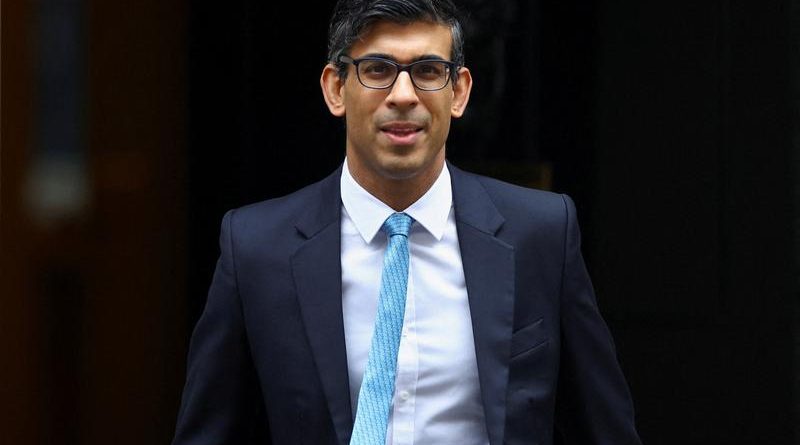UK and EU leaders to meet Monday to finalise Northern Ireland deal
LONDON (Reuters) -British Prime Minister Rishi Sunak is expected to announce a new deal on post-Brexit trade rules for Northern Ireland on Monday, gambling that the reward of better terms with the European Union is worth the discord it might cause within his own party.
European Commission President Ursula von der Leyen will travel to England for final talks, with a press conference pencilled in for the afternoon if the two sides can agree terms.
The deal seeks to resolve tensions caused by the 2020 post-Brexit arrangements governing the British province and its open border with EU member Ireland, but it remains to be seen whether it will go far enough to end political deadlock in Northern Ireland and satisfy critics in Britain.
“The prime minister wants to ensure any deal fixes the practical problems on the ground, ensures trade flows freely within the whole of the UK, safeguards Northern Ireland’s place in our Union and returns sovereignty to the people of Northern Ireland,” a statement from Sunak’s office said.
Sunak is hoping that a successful negotiation will clear the way for him to focus voters’ attention on domestic reforms as he seeks to overcome the opposition Labour Party’s large lead in opinion polls before a national election expected in 2024.
The deal is expected to ease physical checks on goods flowing from Britain to Northern Ireland and give the British province a say over the EU rules it has to implement under the complicated terms of Britain’s exit from the bloc.
But the overall success of any deal could hinge on whether it convinces the pro-British Democratic Unionist Party (DUP) to end its boycott of Northern Ireland’s power-sharing arrangements.
Power sharing was central to a 1998 peace deal which mostly ended three decades of sectarian violence in the province.
Without DUP support, Sunak is also likely to face a rebellion from the eurosceptic wing of his Conservative Party, reviving the deep ideological divisions that have at times paralysed the government since the vote to leave the EU in 2016.
“If there is a revolt on his own benches (of lawmakers) he risks a loss of credibility of the sort that brought down his three predecessors,” the Daily Telegraph newspaper said.
SOVEREIGNTY CONCERNS
Resolving the long-simmering tensions with Brussels could help unlock improved cooperation in other areas, including over the regulation of financial services and scientific research.
As part of its exit agreement, Britain signed an accord with Brussels known as the Northern Ireland protocol to avoid imposing politically contentious checks along the 500-km (310-mile) land border with Ireland.
But the protocol effectively created a border for some goods moving from Britain because it kept Northern Ireland in the EU’s single market for goods. That also left Northern Ireland subject to some EU rules even though it was not a member of the bloc.
Perceptions that the protocol erodes Northern Ireland’s place in the UK have sparked anger among many in unionist communities.
Britain’s deputy prime minister, Dominic Raab, said the deal would need to give Northern Ireland a say in new EU rules, but whether that goes go far enough to win over the DUP will likely depend on legal interpretations of the final texts.
Both the DUP and the European Research Group, which brings together pro-Brexit Conservative lawmakers, have said they will study the details of any new agreement before giving their verdict, a process that could take days.
“I think, from what I’ve heard, he’s (Sunak) done very well, but I’m not sure that he has achieved the objective of getting the DUP back into power sharing, which is the fundamental point of it,” former Conservative minister Jacob Rees-Mogg told ITV.
Source: Read Full Article


